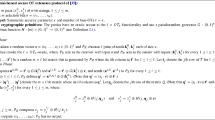Abstract
Oblivious transfer (OT) is a simple, but powerful cryptographic primitive, on the basis of which secure two-party computation and several other cryptographic protocols can be realized. In this paper, we show how OT can be implemented by Strong Physical Unclonable Functions (PUFs). Special attention is thereby devoted to a recent subclass of Strong PUFs known as SHIC PUFs. Our results show that the cryptographic potential of these PUFs is perhaps surprisingly large, and goes beyond the usual identification and key exchange protocols.
Access this chapter
Tax calculation will be finalised at checkout
Purchases are for personal use only
Preview
Unable to display preview. Download preview PDF.
Similar content being viewed by others
References
Pappu, R., Recht, B., Taylor, J., Gershenfeld, N.: Physical One-Way Functions. Science 297, 2026–2030 (2002)
Tuyls, P., Skoric, B.: Strong Authentication with Physical Unclonable Functions. In: Petkovic, M., Jonker, W. (eds.) Security, Privacy and Trust in Modern Data Management, Springer, Heidelberg (2007)
Rabin, M.O.: How to exchange secrets by oblivious transfer. Technical Report TR-81, Harvard University (1981)
Even, S., Goldreich, O., Lempel, A.: A randomized protocol for signing contracts. In: Rivest, R.L., Sherman, A., Chaum, S. (eds.) Proc. CRYPTO 1982, pp. 205–210. Plenum Press, New York (1982)
Crépeau, C.: Equivalence between two flavors of oblivious transfer. In: Pomerance, C. (ed.) CRYPTO 1987. LNCS, vol. 293, pp. 350–354. Springer, Heidelberg (1988)
Yao, A.C.-C.: How to generate and exchange secrets. In: Proc. of the 27th IEEE Symposium on the Foundations of Computer Science (FOCS), pp. 162–167 (1986)
Goldreich, O., Micali, S., Widgerson, A.: How to play any mental game, or a completeness theorem for protocols with honest majority. In: Proc. of the 19th Annual Symposium on the Theory of Computing (STOC), pp. 218–229 (1987)
Goldreich, O., Vainish, R.: How to solve any protocol problem – an efficiency improvement. In: Pomerance, C. (ed.) CRYPTO 1987. LNCS, vol. 293, pp. 73–86. Springer, Heidelberg (1988)
Kilian, J.: Founding cryptography on oblivious transfer. In: Proceedings, 20th Annual ACM Symposium on the Theory of Computation, STOC (1988)
Crepeau, C., van de Graaf, J., Tapp, A.: Committed oblivious transfer and private multi-party computations. In: Coppersmith, D. (ed.) CRYPTO 1995. LNCS, vol. 963, pp. 110–123. Springer, Heidelberg (1995)
He, G.P., Wang, Z.D.: Oblivious transfer using quantum entanglement. Physical Review A 73(1), Part A, 012331 (2006)
Wehner, S., Schaffner, C., Terhal, B.M.: Cryptography from noisy storage. Phys. Rev. Lett. 100(22), 220–502 (2008)
Naor, M., Ostrovsky, R., Venkatesan, R., Yung, M.: Perfect zero-knowledge arguments for NP using any one-way function. Journal of Cryptology 11(2), 87–108 (1998)
Cachin, C., Crepeau, C., Marcil, J.: Oblivious transfer with a memory-bounded receiver. In: Proceeding of the 39th Annual Symposium on Foundations of Computer Science (1998)
Ding, Y.Z., Harnik, D., Rosen, A., Shaltiel, R.: Constant-Round Oblivious Transfer in the Bounded Storage Model. Journal of Cryptology (2007)
Crepeau, C.: Efficient cryptographic protocols based on noisy channels. In: Fumy, W. (ed.) EUROCRYPT 1997. LNCS, vol. 1233, pp. 306–317. Springer, Heidelberg (1997)
Wullschleger, J.: Oblivious Transfer from Weak Noisy Channels. In: Reingold, O. (ed.) TCC 2009. LNCS, vol. 5444, pp. 332–349. Springer, Heidelberg (2009)
Guajardo, J., Kumar, S.S., Schrijen, G.J., Tuyls, P.: FPGA Intrinsic PUFs and Their Use for IP Protection. In: Paillier, P., Verbauwhede, I. (eds.) CHES 2007. LNCS, vol. 4727, pp. 63–80. Springer, Heidelberg (2007)
Gassend, B.: Physical Random Functions, MSc Thesis. MIT, Cambridge (2003)
Lim, D.: Extracting Secret Keys from Integrated Circuits, MSc Thesis. MIT, Cambridge (2004)
Gassend, B., Lim, D., Clarke, D., Dijk, M.v., Devadas, S.: Identification and authentication of integrated circuits. Concurrency and Computation: Practice & Experience 1611, 1077–1098 (2004)
Lee, J.-W., Lim, D., Gassend, B., Suh, G.E., van Dijk, M., Devadas, S.: A technique to build a secret key in integrated circuits with identification and authentication applications. In: Proceedings of the IEEE VLSI Circuits Symposium (June 2004)
Majzoobi, M., Koushanfar, F., Potkonjak, M.: Lightweight Secure PUFs. In: IC-CAD 2008 (2008)
Csaba, G., Ju, X., Ma, Z., Chen, Q., Porod, W., Schmidhuber, J., Schlichtmann, U., Lugli, P., Rührmair, U.: Application of Mismatched Cellular Nonlinear Networks for Physical Cryptography. In: IEEE CNNA (2010)
Majzoobi, M., Koushanfar, F., Potkonjak, M.: Testing Techniques for Hardware Security. In: IEEE International Test Conference (2008)
Rührmair, U., Sehnke, F., Soelter, J., Dror, G., Devadas, S., Schmidhuber, J.: Modeling Attacks on Physical Unclonable Functions (submitted 2010)
Rührmair, U., Jaeger, C., Hilgers, C., Algasinger, M., Csaba, G., Stutzmann, M.: Security Applications of Diodes with Random Current-Voltage Characteristics. In: Financial Cryptography and Data Security (2010)
Rührmair, U., Jaeger, C., Bator, M., Stutzmann, M., Lugli, P., Csaba, G.: Applications of High-Capacity Crossbar Memories in Cryptography. IEEE Transactions on Nanotechnology (to appear 2010)
Jaeger, C., Algasinger, M., Rührmair, U., Csaba, G., Stutzmann, M.: Random pn-junctions for physical cryptography. Applied Physics Letters (to appear 2010)
Suh, G.E., Devadas, S.: Physical Unclonable Functions for Device Authentication and Secret Key Generation. In: DAC 2007, pp. 9–14 (2007)
Wolf, S., Wullschleger, J.: Oblivious Transfer Is Symmetric. In: Vaudenay, S. (ed.) EUROCRYPT 2006. LNCS, vol. 4004, pp. 222–232. Springer, Heidelberg (2006)
Cover, T.M.: Enumerative Source Encoding. IEEE Transactions on Information Theory 19(1), 73–77 (1973)
Author information
Authors and Affiliations
Editor information
Editors and Affiliations
Rights and permissions
Copyright information
© 2010 Springer-Verlag Berlin Heidelberg
About this paper
Cite this paper
Rührmair, U. (2010). Oblivious Transfer Based on Physical Unclonable Functions. In: Acquisti, A., Smith, S.W., Sadeghi, AR. (eds) Trust and Trustworthy Computing. Trust 2010. Lecture Notes in Computer Science, vol 6101. Springer, Berlin, Heidelberg. https://doi.org/10.1007/978-3-642-13869-0_31
Download citation
DOI: https://doi.org/10.1007/978-3-642-13869-0_31
Publisher Name: Springer, Berlin, Heidelberg
Print ISBN: 978-3-642-13868-3
Online ISBN: 978-3-642-13869-0
eBook Packages: Computer ScienceComputer Science (R0)




